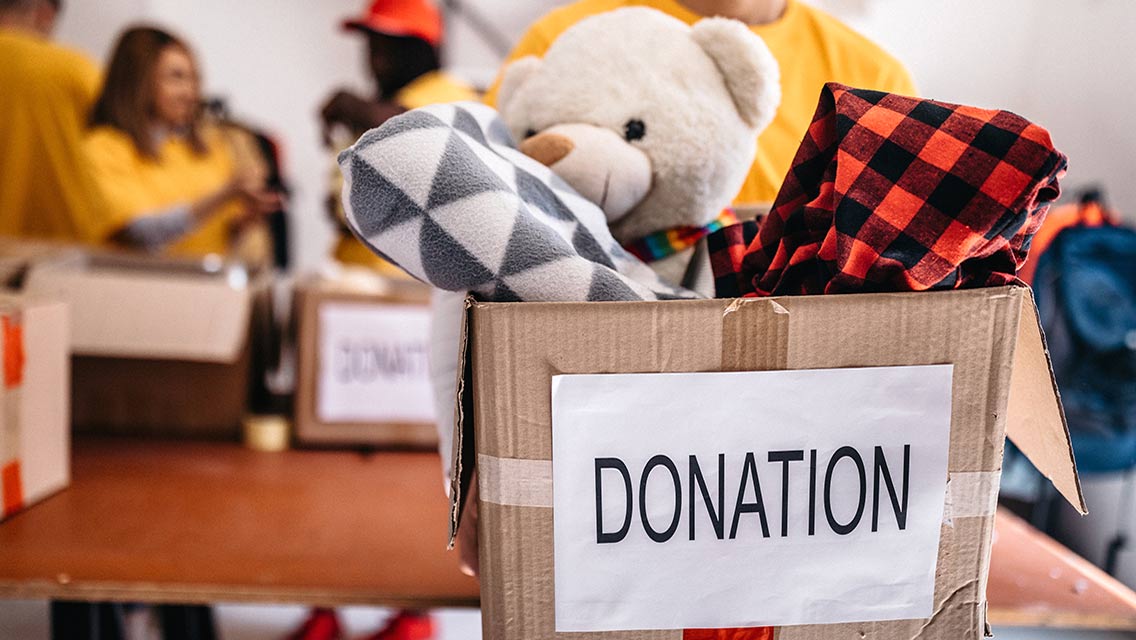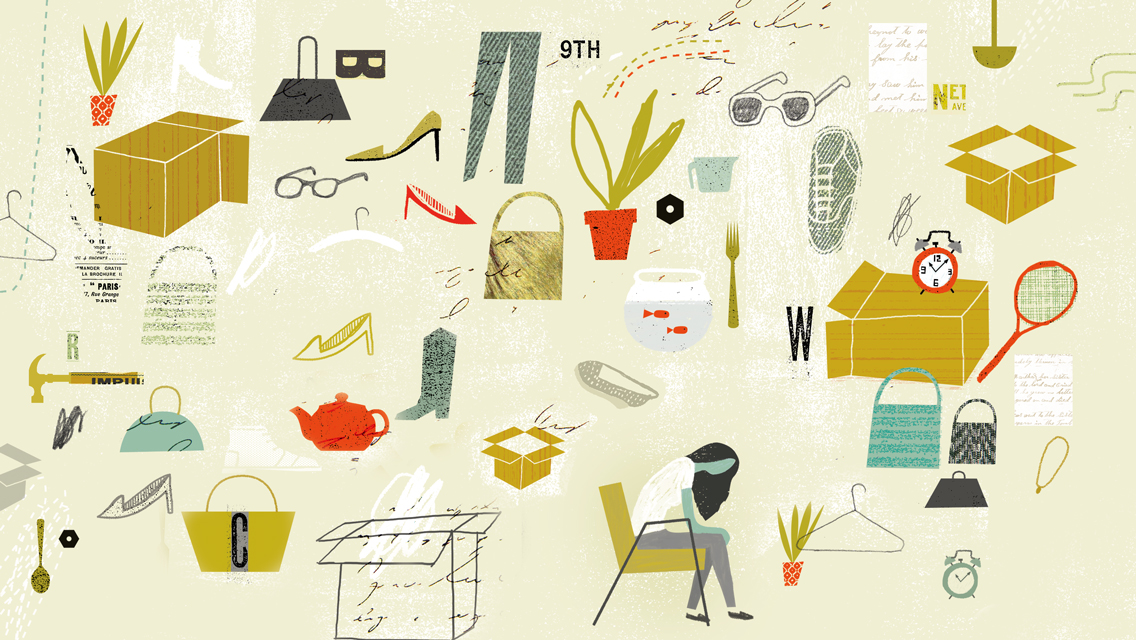New Year’s resolutions have never held much appeal to me. I’m not goal-oriented by nature, unless you want to count editorial deadlines. I know what needs to be done, more or less, in my personal life, but I try not to obsess. If I get it done, I get it done; if I don’t get around to it today, maybe I’ll get around to it tomorrow.
I’m getting around to dealing with the mountains of stuff that have been occupying space in our basement storage room for the past decade, some of which My Lovely Wife and I have been carting around with us from one address to another for the past 45 years. It presents a conundrum common to seniors, into whose possession often fall belongings abandoned by both ends of the family continuum — deceased parents and departed offspring — along with emotion-laden mementos we’ve collected over the years and refuse to discard for reasons that defy rational explanation.
On a shelf above my desk, for instance, sits a smiling 3-inch-tall something-or-other my son sculpted some 20 years ago from the clay-laden dirt in the front yard of a former residence. I suppose it reminds me that he once dabbled in pottery or that the soil there was particularly unsuited to growing vegetables, but I can’t really say why I haven’t tossed it. Maybe because it doesn’t take up much space.
I can’t say the same for the boxes in the basement, which have seemingly procreated over the years and rendered our once-ample shelving solution almost laughably insufficient. A cursory survey a couple of weeks ago revealed some interesting patterns.
Among the items once attached to our daughter:
- Scores of National Geographic issues dating from the 1970s that she inherited from her grandfather and still claims she covets.
- Boxes of clothing that somehow never followed her out the door when she flew the coop after college.
- Her childhood rocking chair, doll cradle, Beanie Babies, American Girl doll paraphernalia, and a partially inflated soccer ball.
- A grade-school report card noting that her English and math scores hovered in the hazy area above the average.
Among the items left behind by our son:
- A box containing outdated computer hardware and random detritus from his single semester in college.
I sifted through some of our son’s former belongings and discovered I could toss everything without the slightest twinge of remorse. The former jarhead is, to put it mildly, an unsentimental guy; I didn’t even feel the need to ask. When I queried our daughter about her stash, however, she couldn’t remember the rocking chair and equivocated on the doll stuff (“We’ll see when we have kids.”) but confirmed her keen interest in the magazines. We aren’t going to be able to lean on her, it seems, to help us decide what to keep and what to discard. Some of this stuff may mean more to us than it does to either of them.
Awaiting some inspiration (or maybe a little holiday magic), I happened upon a piece in the Washington Post by Bonnie Miller Rubin, whose own decluttering challenge offers both empathy and instruction for those of us struggling under the weight of accumulated stuff — and the memories they may represent.
“What parent wouldn’t save a handmade valentine from a now 40-year-old son?” she writes. “The one that simply says, ‘I love you, Mom,’ written back when he was a first-grader and still generous with his hugs and kisses.” (MLW has one of these grade-school declarations from our son tacked to the bulletin board in her studio.)
Rubin also can’t imagine tossing the scrapbook in which her father taped every one of her published articles. “Hauling around this bulky book is tangible evidence that, even in the fog of old age, I will never forget his pride,” she admits. (I still have a batch of my clippings — along with my Cub Scout uniform — Mom saved for me.)
Rubin laments her inability to find the time to rifle through the boxes in her cluttered basement, but Carleton University psychology professor Timothy Pychyl, PhD, tells her that procrastination is natural when you consider the task. Who wants to grapple with the fraught decisions that arise when we begin calculating the emotional value of something that’s long been hidden? “It’s not about time management. It’s about avoiding negative emotions,” Pychyl explains. “Putting off the task allows us to put off the emotions.”
While we’ve been mostly stymied in our efforts to cull those boxes in the basement, MLW suggested the other day that we shift to Plan B in our decluttering project until we can convince the kids to survey the inventory in the basement and grab what they want to add to their own growing supply of memorabilia. She’d discovered a local nonprofit store that accepts used clothing, household goods, books, and such for resale to the needy. Donating these sorts of items, she reckoned, would at least generate some momentum on the decluttering front while providing some needed goods for those less fortunate than us.
No tears were shed for the pants, shirts, and sweatshirts I hadn’t worn in years, nor for the blender we’d been given and never used. And we’ve been trying to reduce the burden on our sagging bookshelves for months, so no remorse accompanied the boxes we filled with our less-revered volumes. We packed it all into the car late one afternoon and headed to the store.
The loading dock was located at the far end of an alley hemmed in on both sides by windowless buildings. I popped the trunk, rang the doorbell, and waited. No answer. I rang again. Minutes passed. I rang a third time and began to wonder if we’d arrived too late in the day.
I ambled the few steps back to the car, imagining how we’d return home with our cargo, unload it in the garage, and forget it until spring. When I glanced back at the loading dock a moment later, a middle-aged man dressed in a hoodie had appeared seemingly out of nowhere and began repeatedly ringing the doorbell.
“I guess you have to ring it more than once,” I ventured, a little shaken by his sudden materialization.
“Who knows what those knuckleheads are up to,” he mumbled more to himself than to me. “I’ll go around to the front.”
I watched him walk up the alley. “Did you see where that guy came from?” I asked MLW, who was camped in the passenger seat looking at her phone. She shook her head. I glanced around the back corner of the building where another alley intersected with the one where we were parked. No car, no doorways, nothing.
The loading dock door soon rolled open, and I began handing boxes to a worker. It was not the guy we’d seen ringing the doorbell. I suppose I could’ve asked the worker about our apparition, but I figured I’d let it go. A carload of stuff had been successfully relocated and, as we all learned as children, holiday magic is best left unquestioned.





This Post Has 0 Comments